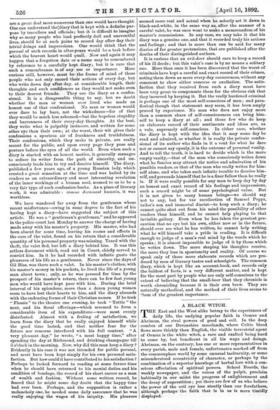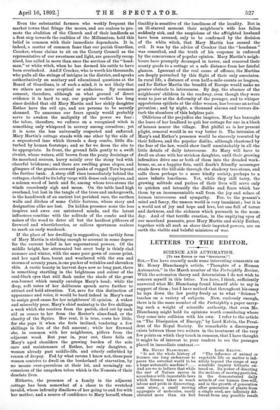A BLACK WITCH.
THE East and the West alike betray to the experiences of' daily life, the undying popular faith in Ormuz and Ahriman, the rival powers of good and evil. In the deep combes of our Devonshire moorlands, where Celtic blood flows more thickly than English, the visible terrestrial agent of Ormuz is the white witch, a rare and exalted being hard to come by, but beneficent in all his ways and doings. Ahriman. on the contrary, has one or more representatives in every parish, male and female, unfortunates marked off from the commonplace world by some unusual taciturnity, or some misunderstood eccentricity of character, or perhaps by the
of a superior knowlege of herbal lore with a con- scious affectation of spiritual powers. School Boards, the weekly newspaper, and the voices of the pulpit, proclaim habitually in our midst the progress of enlightenment and the decay of superstition ; yet there are few of us who believe the power of the evil eye less stoutly than our forefathers, although perhaps the faith that is in us is more timidly displayed. Even the substantial farmers who weekly frequent the market towns that fringe the moors, and are zealous to pro- mote the abolition of the Church and of their landlords as a first step towards the realities of the Millennium, hold this belief in common with their immediate dependants. It is, indeed, a matter of common fame that our parish Guardian, Crocker, whose claims to sit on the County Council as the representative of our sweetness and light, are generally recog- nised, has called in more than once the services of the "head- man," or white witch, when he has deemed his cattle to have been overlooked. And if Crocker, who is worth his thousands, who pulls all the strings of intrigue in the district, and speaks authoritatively on sanitary and educational questions at the Board of Guardians, is of such a mind, it is not likely that we others are more sceptical or audacious. By common consent, therefore, although on what ground of direct evidence it is hard to say, our popular verdict has long since decided that old Mary Martin and her sickly daughter Esther have the evil eye, and are persons to be secretly shunned. To announce our fears openly would probably -serve to awaken the malignity of the power we fear : the taboo, therefore, we enforce on a recognised witch is something only whispered in secrecy among ourselves ; yet it is none the less universally respected and enforced. Mary Martin's cottage stands with one other by the side of a sequestered lane which threads a deep combe, little dis- turbed by human footsteps ; and so far we deem the site to be appropriate. In front, the ground falls gently to a swift rivulet, whose waters, still brown from the peaty drainings of its moorland sources, hurry noisily over the stony bed with -cheerful briskness ; and there are swelling grass slopes, and glimpses of the granite-crowned peaks of rugged Tors beyond the further bank. A steep cliff rises immediately behind the -cottages, clothed to its lofty verge with dense oak coppices, and a solemn wood of larch and fir, among whose tree-stems the winds ceaselessly sigh and moan. On the table land high -overhead, but lost in the tangle of the trees and undergrowth, is the handiwork of an ancient but perished race, the earthen walls and ditches of some Celtic fortress, whose story and designation alike are lost. Its hidden presence none the less inspires and awes our untutored minds, and the latent influences combine with the solitude of the combe and the -noises of the wood to deter all but the hardiest pilferers of firewood and whortleberries, or callous sportsmen zealous to mark an early woodcock.
If the place of her dwelling is suggestive, the earthly form of Mary Martin is Striking enough to account in some degree for the current belief in her supernatural powers. Of the middle height, her attenuated but erect body is thinly clad -summer and winter, with the same poor gown of coarse print, and her aged face, burnt and weathered with the sun and -storms of seventy years, is one pucker of wrinkles and shrunken skin. A rustic beauty in harvest days now so long past, there is something startling in the brightness and colour of the -coal-black eyes that still flash under the shade of the great sun-bonnet which usually envelops Mary's head ; while the deep, soft notes of her deliberate speech serve further to attract and hold attention. Yet, save for this distinction of appearance and voice, it would be hard indeed in Mary's case to assign good cause for her neighbours' ill opinion. A widow and miserably poor, Mary's chief mainstay is the five shillings a week which she receives from the parish, eked out by such aid as comes to her from the Rector's alms-fund, or the charity of the Squire. Her rent, it is true, costs her little,
-for she pays it when she feels inclined, tendering a few
shillings in lieu of the full amount ; while her firewood -she, in common with her neighbours, pilfers from the adjacent wood. Bat year in, year out, there falls on Mary's aged shoulders the growing burden of the sole .care and maintenance of Esther, her only daughter, a -woman already past middle-life, and utterly enfeebled by reason of dropsy. Fed by what ravens I know not, these poor -women 'contrive to dwell on the borderland of starvation, by no means over-querulous at their lot, and seemingly nn- • conscious of the unspoken taboo which is the Nemesis of their desolate lives.
Hitherto, the presence of a family in the adjacent cottage has been somewhat of a cheer to the wretched invalid, whose infirmity disallows of her going to and fro with her mother, and a source of confidence to Mary herself, whose timidity is sensitive of the loneliness of the locality. But in an ill-starred moment their neighbour's wife has fallen suddenly sick, and the suspicions of the affrighted husband have been aroused, only to be confirmed by the decision of the white witch, that Mary Martin has caused the evil. It was by the advice of Crocker that the " headman " was consulted, and the truth of his response is enforced by the concurrence of popular opinion. Mary Martin's neigh- bours have promptly decamped in terror, and removed their scanty goods to a cottage at a safe distance from her fateful glances. Ignorant of the real cause of offence, the Martins are deeply perturbed by this flight of their only associates. In rural life, a distance of even half-a-mile counts as leagues, and for Esther Martin the breadth of Europe would make no greater obstacle to intercourse. By day, the absence of the neighbours' children in the roadway, even though they were wont to jeer at the deformity of the younger, and to whisper opprobrious epithets at the elder woman, has become an actual privation ; and by night, a thousand alarms and terrors dis- turb the slumbers of this helpless pair.
Oblivious of the prejudice she inspires, Mary has besought- the leave of her landlord to quit her cottage for one in a block of houses nearer the village. But pitiful as is her present plight, removal would in no way better it. The intrusion of Mary's and Esther's presence would be sincerely resented by their fellows, and the popular dislike, although chastened by the fear of the law, would show itself unmistakably in all the little details of daily intercourse. So Mary will have to dwell on alone with her stricken daughter, until their growing infirmities drive one or both of them into the dreaded work- house, or, as a happier fate, until death's friendly messenger steals down the hill-side through the shadowy tree-stems, and calls them perhaps to a more kindly society, perhaps to a more infinite loneliness. Yet, while they still tarry, the growing solitude and pathos of their lives will serve only to quicken and intensify the dislike and fears which bar them by an insurmountable wall from the joy and solace of human intercourse and sympathy. For, to the peasant's mind and fancy, the unseen world is very imminent ; but it is a world not of joy and hope and love, but one full of terror and darkness, and the sickness which pnrsueth in the noon- day. And of that terrific creation, in the unpitying eyes of our moorland peasants, poor Mary Martin and sickly Esther, together with all such as share their imputed powers, are on earth the visible and baleful ministers of woe.

































 Previous page
Previous page